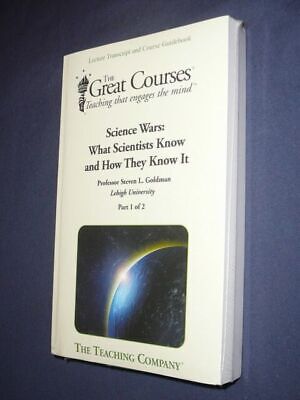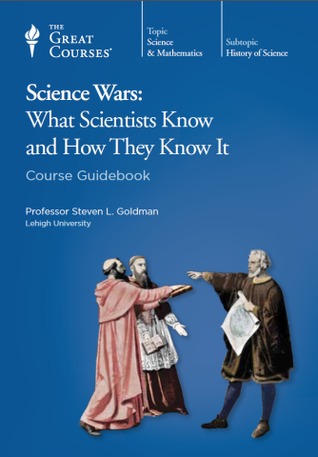|
Word Gems
exploring self-realization, sacred personhood, and full humanity
Universal, Necessary, Certain
“The soul should always stand ajar, ready to welcome the ecstatic experience.” Emily Dickinson

|
Dr. Goldman's taped lectures are very good, but, for ease of access and to save time, I would recommend this study guide (parts 1 and 2), containing summaries and verbatim transcripts of his lectures.
|
Professor Steven Goldman was introduced on the “knowledge” page, in an article which featured the thesis of his lectures, “what scientists know and how they know it.”
There is a certain core concept from his teaching, which, in my opinion, is so important, so foundational to accurately perceiving much in history, that it well deserves special laudation on this page.
As with all great ideas, much could be said, many volumes could be written. As such, I must content myself with a very brief outline of the gem of understanding that Goldman provides – along with an encouragement to the reader to explore his discourses firsthand.
Allow me to synthesize the essential precept:
universal, necessary, certain
There is a major debate in history, from the ancient Greeks to modern times, concerning the nature of knowledge.
Is knowledge something rock solid, unchanging, eternal -- universal, necessary, certain? Is there such a thing as knowledge which is true in all places, at all times, possessing such gravitas that “it has to be this way, and couldn’t be any other way,” plus presenting itself beyond any shadow of doubt?
particular, contingent, probable
Or is this substantiveness illusion? Instead of universal, necessary, certain, is what we call knowledge endowed only with the particular, contingent, probable?
|
experience-validated educated opinion
Contending with those who assert that knowledge can be universal, necessary, certain is another group of thinkers – again, since the time of the ancient Greeks – who take the view that what we know always becomes outdated at some point. This being the case, what we call knowledge or our theories, at best, can never rise above or be more than – Goldman’s phrase – “experience-validated educated opinion”.
Far from knowledge being rock solid, what we know, or think we know, should be considered no better than beliefs and opinions. Because more and new data will always be forthcoming, these beliefs and opinions, Goldman says, “are inevitably uncertain, more or less probable, and context dependent, or particular.”
|
For example, Dr. Goldman helped me to distill some of the underlying essence of Kantian philosophy. See my studies of Kant here.
It had escaped my attention that the professor from Konigsberg begins his teachings with an unyielding premise that knowledge exists as universal, necessary, certain. Pillar examples of this solidity, for Kant, were Newtonian physics and Euclidian geometry; each of these was deemed to be "final word" and couldn't be superseded. However, later, Newtonianism was replaced by quantum mechanics as more fundamental, and then non-Euclidianian geometries were invented. This iconoclasm undermined the work of Kant even though, he judged, his mode of acquiring knowledge, outlined in the “Critique Of Pure Reason,” as unassailable.
Editor's note: Despite these shortcomings in Kant's work, his philosophy is still highly regarded. Some of this is warranted as he was the first to understand (1) presaging Einstein (who would have read Kant), that time and space are illusions, and (2) the mind is not a passive blank slate but, in fact, manages and massages, alters, the sensory data coming from "out there."
the flaw of deductive reasoning
Deductive reasoning is to decide from the beginning what the conclusion ought to be, and then building a logical structure around this initial premise. Some have called this, painting the target around the bulls-eye.

The problem would seem obvious. How can we definitively declare ourselves for this-or-that position when information is always sparse? - even worse, when it can never be full-bodied and complete.
How can we speak of universal "laws" or "infallible" doctrines when our grasp of reality is utterly limited, and always subject to error? How can we speak as if we know something, as if we were privy to what happens in all corners of the universe; as if we had access to unlimited data?
|
we hubristically speak of universal 'laws' but clarity here would require godlike powers of perception, and good luck to us with that
“Laws” of science, nevertheless, today are still talked about in high school and college textbooks, as if the concept were credible.
But Nobel laureate in physics Dr. Richard Feynman blasted the idea of any notion of solid “law” in science because our knowledge, on any subject, is always rather skimpy.
"We do not yet know all the basic [principles of physics]: there is an expanding frontier of ignorance... one needs a considerable amount of preparatory training even to learn what the words [of physics] mean... Each piece, or part, of the whole of nature is always merely an approximation to the complete truth, or the complete truth so far as we know it. In fact, everything we know is only some kind of approximation... Therefore, things must be learned only to be unlearned again, or, more likely, to be corrected."
Or Dr. John Wheeler, who invented the phrases "black hole", "worm hole", "there is no out there out there", also "it from bit":
"We live on an island of knowledge surrounded by an ocean of ignorance. As our island of knowledge grows, so does the shore of our ignorance."
|
But we don’t need to center on Kant’s misreckonings. Once we attune ourselves to what Professor Goldman is putting forth, we will see this battle to define knowledge virtually everywhere – and almost everywhere we find these grand pronouncements of deductive reasoning. We find persons and institutions making absolute statements of scientific “law” concerning how the universe is and works, what God is and how s/he operates, what human beings are and what they ought to do. All of these pontifications are beyond investigation, extend into domains of unreachable knowledge, things that humans cannot know. And yet people easily create their metaparadigms, live and die by these unsubstantiated, unverified -- and unverifiable -- claims.
I must keep this commentary brief as too much might be said. I count this area as one of the most important on the WG site. And what is fueling this rabid quest for the “universal, necessary, certain”? Why do people want this so much?
Only a study of the mystical realms will help us with this question. It is the false self’s hidden obsession with the fear of death, the search for security and safety in a hostile world; more fundamentally, a healing balm for the ego’s “I don’t have enough” because “I am not enough.”
|
That which was true yesterday, though still retaining elements of truth, is not totally so in the light of new knowledge. Knowledge is ever changing. Mankind is always experiencing more, gaining sharper understanding, greater realisation, augmentated wisdom and, in consequence of this expanding vista, knowledge, in a sense, becomes ignorance with the advent of additional data.
An ancient Chinese man, from the other side, offered testimony via Leslie Flint direct-voice mediumship; tape-recorded July 30th 1959.
"I have lived on your plane of Earth centuries ago, in China. I have been called by several names, and I do not feel that it would be any advantage for you to know these names... For a man who was wise, as you understand it, upon Earth, as soon as he passes through the gates called death, he realises that his Earthly wisdom was as naught. Wisdom is purely the condition or state of being which may apply, and does apply, until such time as you have progressed to a further state - and that which was wisdom in the past becomes ignorance, in consequence of the wisdom gained. Wisdom is something which is a state of being according to one's knowledge of things appertaining at the time. But that which was true yesterday, though it has still elements of truth, is not so in the light of new knowledge. Knowledge is something which is ever changing. Man is ever experiencing new things, gaining greater understanding, greater realisation, greater wisdom and, in consequence, because movement is life, because man cannot remain stationary, knowledge becomes ignorance through the light of new knowledge… We who come to you know that man will only find divine truth when he himself becomes divine, when he himself becomes spiritually attuned into the higher spheres and the greater souls who come… [There are] tremendous things that lie further ahead in the higher spheres - where it is impossible in words to depict in any shape or form such a condition of life… You cannot see these things, for you are not ready to see. You cannot understand these things, for you are not ready to understand. We are not in a world that is three dimensional. We are in a world that is four dimensional, which you could not possibly conceive or understand. It is beyond your comprehension… To all those who seek I say, seek. At the same time remember, that you must be as children and have faith and keep open wide the door that it may enter therein and realise that truth is ever-changing. That which was truth yesterday won't remain as truth, in the light of new truth… It is only, as it were, a little aspect - for we must always remember, it is but a grain, like of sand in the desert of truth, a grain of truth in a huge sea of sand or desert.”
|
‘scientific method’ as sacred cow
The ‘scientific method’, as Professor Goldman points out, has various meanings. In a general sense, the phrase tends to indicate empirical research, verified by independent sources, leading to substantive conclusions. This is all well and good, and has been a huge step forward for humankind, emerging from the mental chaos of superstition.
Or not - at least, not as much as we might suspect.
I have noticed, both in the afterlife-research domain and in science at-large, that the phrase ‘scientific method’ is put forward as a sacred cow; meaning, “we used the scientific method for our results and so we really know, and don’t even think about questioning us.”
But all ‘scientific methods’ are not equal. They come in two major forms, with basis in deduction or induction; that is, beginning with the conclusion and then finding evidence to support it, as opposed to fact-gathering in an open research before making any predictive statements.
The big problem, however, with the deductively-based approach is that, if you go looking for evidence for your pet theory, you will surely find it – but only by a selective winnowing of the facts. And most of what is called ‘scientific method’ is just this sort of dishonest deductively-based format.
Goldman leads us through stories of several stellar-name scientists of history, and asserts that many of these, while famous for discovering this-or-that, in fact had no solid undergirding for their claims. They were guessing, and some were lucky and some were not. Well, the educated guess is often part of the discovery process, but the surmising needs to be validated at some point. But this validation, however, might be hard to come by and is often not even possible to attain.
As usual, when the needy ego gets involved, in this case, with science, it will pervert ways-and-means in order to get what it wants, and find basis for its distorted view of life. It cares nothing for the truth but only to aggrandize itself at the expense of others. But, in all this charade, let’s not be surprised when the ego exclaims to intimidate, “we used the scientific method, so we really know.”
|
Editor's last word:
As a young man, I believed that knowledge, if it could be accessed, is “universal, necessary, certain.” And I wanted to get at it.
But then, some time later, I was fortunate to come across a great teacher in my life who helped me understand that what we know, or think we know, must always be held loosely in one’s hands, pending further light.
There’s a big universe of information out there, and there will always be more light, more data, coming in, which, at minimum, will modify current understanding, or even overthrow as obsolete what we deemed to have been incorrigible. This process, it is the opinion of ancient Spirit Guides, will go on and on. There is no end to learning, they say.
quantum reality
The evidence indicates that we live in a quantum reality, both in this world and in ones to come. What does this mean? - it means that there's an element of probability and uncertainty built into the very fabric of "what is".
This seems to be so as free choice, creativity and personal growth will always be allowed environment to express.
As such, there may be no such thing as rigid-and-absolute knowledge -- anywhere. This doesn't mean that we can't rely on some things, as the probability for these might be very near 100%.
I began this page with a reference to Emily Dickinson's comment on the ecstatic experience. There is a domain of certain knowledge existing beyond the reach of reason and the five senses.
Ultimate truth is intuitively grasped and apprehended. This is where the real gold is.
Editor's note: Kant began his "Critique" lamenting the sad state of metaphysics, which attempts to answer the big questions about God, immortality, and the nature of man, but without a capacity to arrive at definitive answers. The "Critique" was an investigation of the limits of reason, "pure" reason, as he called it, meaning, how far can human reason take us, even without an appeal to experience and an ingathering of facts? As we discover, insights regarding the larger questions are mystically discerned and, in a sense, are not accessible to mere reason, brain-power, at all.
|
|



